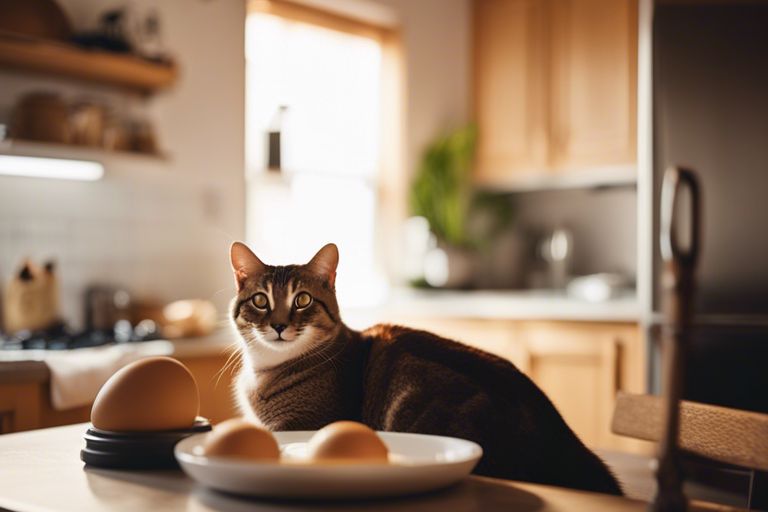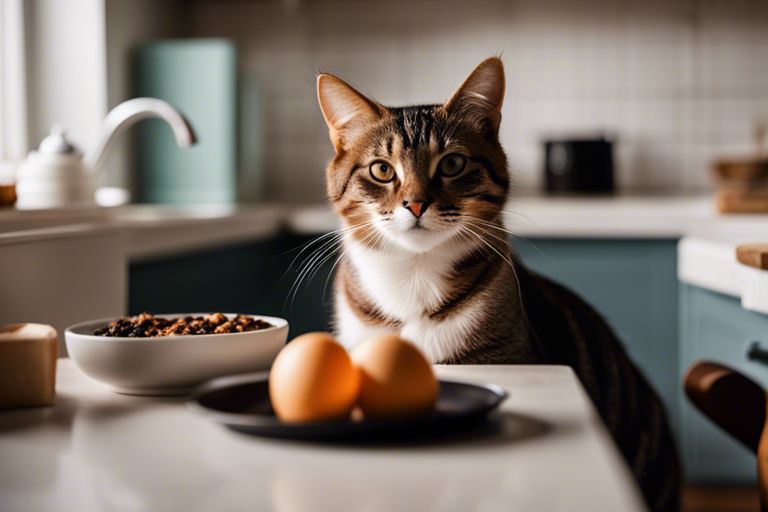As a cat owner, you may find yourself wondering if it is safe for your feline friend to eat cooked eggs. Cats can indeed eat cooked eggs in moderation and it can be a healthy addition to their diet. Eggs are a great source of protein and contain essential amino acids that cats need to thrive. However, it is important to be aware of the potential risks associated with feeding cats eggs, such as the potential for salmonella poisoning or biotin deficiency if fed in excessive amounts. It is crucial to properly cook the eggs and avoid adding any seasoning or additional ingredients that could be harmful to your cat. In this blog post, we will delve into the topic of cats and eggs, exploring the benefits and potential risks to help you make an informed decision about whether or not to incorporate eggs into your cat’s diet.

The Nutritional Benefits of Eggs
Obviously, eggs are a powerhouse of nutrients, making them a valuable addition to your cat’s diet. They are an excellent source of high-quality protein, vitamins, and minerals that can contribute to your cat’s overall health and wellbeing.
Protein Content in Eggs
On top of being a great source of protein, eggs contain all nine essential amino acids that cats need to thrive. This is crucial for muscle development, tissue repair, and overall growth in your feline friend. The protein content in eggs can also aid in weight management and provide long-lasting energy for your cat.
Vitamins and Minerals Found in Eggs
Nutritional wise, eggs are also packed with essential vitamins and minerals that can benefit your cat’s health. They are a good source of Vitamin A, which is important for vision and skin health. Eggs also contain B vitamins, such as Biotin and Riboflavin, which play a significant role in your cat’s overall wellbeing.
Eggs also provide minerals like iron and zinc, which are essential for maintaining a healthy immune system and promoting proper growth and development in cats. Including eggs in your cat’s diet can help ensure that they are getting these vital nutrients.
Safe Preparation of Cooked Eggs for Cats
If you’ve ever asked yourself, “can cats eat eggs?” the answer is yes, cooked eggs are generally safe for cats to consume in moderation. According to the Australian Eggs organization, eggs are a nutritious source of protein and essential amino acids for cats, and can be a tasty addition to their diet.
How to Cook Eggs for Your Cat
Cats can safely consume cooked eggs, such as boiled or scrambled eggs, as a part of their diet. When preparing eggs for your cat, ensure that they are fully cooked to prevent the risk of salmonella contamination. You can also consult with your veterinarian for guidance on the appropriate portion size for your individual cat.
Foods to Avoid Mixing with Eggs
Cooked eggs are generally safe for cats, but it’s important to be mindful of other foods that should not be mixed with eggs when feeding your cat. Avoid adding any seasoning, such as salt or pepper, as these can be harmful to your feline friend. Additionally, refrain from mixing eggs with toxic foods for cats, such as onions, garlic, or chocolate.
Eggs, when prepared and served in a safe manner, can be a beneficial addition to your cat’s diet, providing them with essential nutrients and promoting overall health. However, it’s crucial to be aware of potential dangers posed by certain foods and to always prioritize the well-being of your beloved pet.
Potential Risks and Considerations
Despite the many benefits of cooked eggs for cats, there are also potential risks and considerations that cat owners should be aware of before introducing this food into their pet’s diet. It’s important to consider these factors to ensure the health and well-being of your feline friend.
Allergies and Intolerances in Cats
Cats, like humans, can have allergies and intolerances to certain foods, including eggs. Some cats may experience digestive issues, skin irritations, or other adverse reactions after consuming eggs. It’s important to monitor your cat for any signs of allergic reactions or intolerances when introducing cooked eggs into their diet.
Cats with known allergies or sensitivities to eggs should avoid consuming them altogether. If you suspect that your cat may have an allergy or intolerance to eggs, it’s best to consult with a veterinarian for further guidance on an appropriate diet for your pet.
Appropriate Serving Sizes
On the other hand, it’s crucial to consider the appropriate serving sizes when feeding cooked eggs to your cat. While eggs can provide a valuable source of protein and nutrients for cats, excessive consumption can lead to digestive upset and other health issues.
For instance, it’s recommended to limit the amount of cooked eggs in your cat’s diet to avoid potential health complications. Moderation is key when incorporating eggs into your cat’s meals, and it’s essential to consider the overall balance of their diet.

Expert Opinions and Studies
Now that we have explored the nutritional benefits and potential risks of feeding cooked eggs to cats, it’s important to consider what the experts and scientific research have to say on the topic. Veterinarians and researchers have provided valuable insights into the safety and potential benefits of eggs in a cat’s diet.
Veterinarians on Eggs in a Cat’s Diet
On the topic of cats consuming eggs, many veterinarians believe that eggs can be a healthy addition to a cat’s diet when fed in moderation. They emphasize the importance of fully cooking the eggs to eliminate the risk of salmonella and recommend consulting with a veterinarian before introducing eggs to a cat’s diet, especially if the cat has any pre-existing health conditions.
Research Findings on Cats Consuming Eggs
Eggs are a rich source of protein and essential nutrients, making them a potentially beneficial supplement to a cat’s diet. Studies have shown that eggs can contribute to a cat’s overall nutritional intake and may even have positive effects on coat condition and energy levels. However, it’s crucial to note that individual cats may have varying tolerances to eggs, and caution should be exercised when introducing this food.
Cats, like humans, can have allergies or sensitivities to certain foods, and eggs are no exception. It’s important to monitor your cat for any adverse reactions after introducing eggs to their diet, and to consult with a veterinarian if you have any concerns about their health.

Wrapping Up
Conclusively, cats can safely consume cooked eggs as long as they are cooked thoroughly with no added seasonings or oils. Eggs are a great source of protein and essential nutrients for cats, and can be a beneficial addition to their diet when given in moderation. However, it is important to remember that every cat is different, and some may have allergies or sensitivities to certain foods, including eggs. It is always best to consult with a veterinarian before introducing new foods into your cat’s diet to ensure their safety and well-being.
FAQ
Can cats eat cooked eggs?
Yes, cats can safely eat cooked eggs in moderation. Eggs are a good source of protein and can be a healthy addition to your cat’s diet. However, it is important to ensure that the eggs are fully cooked and not seasoned with any ingredients that are toxic to cats, such as onion or garlic.
Is it safe for my cats to eat cooked eggs?
Yes, it is generally safe for cats to eat cooked eggs. In fact, eggs can provide various nutrients such as protein, vitamins, and minerals that can benefit your cat’s health. However, it is important to feed eggs as part of a balanced diet and not as a sole source of nutrition.
Are there any risks associated with feeding cooked eggs to cats?
While cooked eggs can be a healthy addition to your cat’s diet, there are some risks to be aware of. It is important to avoid feeding raw eggs to cats, as they can contain harmful bacteria such as salmonella, which can cause illness. Additionally, some cats may be allergic to eggs, so it’s important to monitor your cat for any signs of an adverse reaction after introducing eggs to their diet.

Hello there, I am Iftekhar Ahmed. I am the owner of Mishka & The Cat Corners. I love to explore and write on various topics about cats

